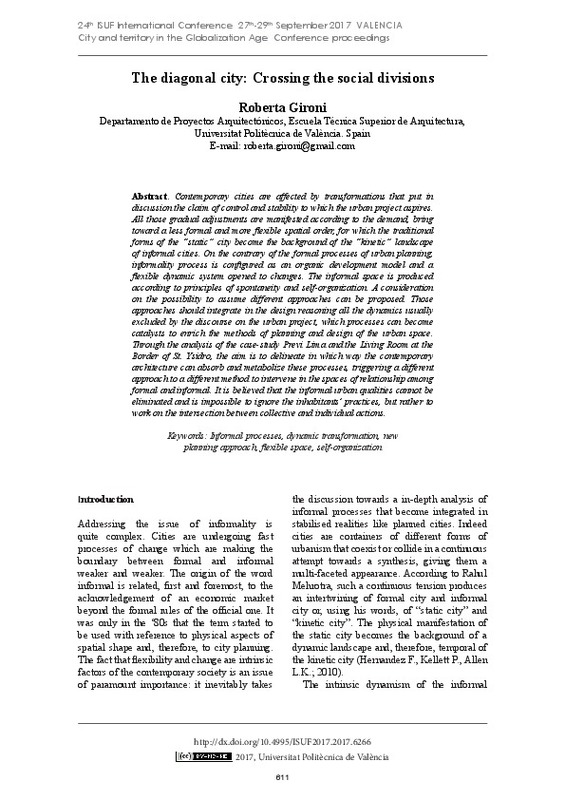JavaScript is disabled for your browser. Some features of this site may not work without it.
Buscar en RiuNet
Listar
Mi cuenta
Estadísticas
Ayuda RiuNet
Admin. UPV
The Diagonal City: crossing the social divisions
Mostrar el registro sencillo del ítem
Ficheros en el ítem
| dc.contributor.author | Gironi, Roberta
|
es_ES |
| dc.coverage.spatial | east=-77.042754; north=-12.0463731; name= Lima, Perú | es_ES |
| dc.date.accessioned | 2018-12-20T08:37:00Z | |
| dc.date.available | 2018-12-20T08:37:00Z | |
| dc.date.issued | 2018-04-20 | |
| dc.identifier.isbn | 9788490485743 | |
| dc.identifier.uri | http://hdl.handle.net/10251/114265 | |
| dc.description.abstract | [EN] Contemporary cities are affected by transformations that put in discussion the claim of control and stability to which the urban project aspires. All those gradual adjustments are manifested according to the demand, bring toward a less formal and more flexible spatial order, for which the traditional forms of the "static" city become the background of the "kinetic" landscape of informal cities. On the contrary of the formal processes of urban planning, informality process is configured as an organic development model and a flexible dynamic system opened to changes. The informal space is produced according to principles of spontaneity and self-organization. A consideration on the possibility to assume different approaches can be proposed. Those approaches should integrate in the design reasoning all the dynamics usually excluded by the discourse on the urban project, which processes can become catalysts to enrich the methods of planning and design of the urban space. Through the analysis of the case-study Previ Lima and the Living Room at the Border of St. Ysidro, the aim is to delineate in which way the contemporary architecture can absorb and metabolize these processes, triggering a different approach to a different method to intervene in the spaces of relationship among formal and informal. It is believed that the informal urban qualities cannot be eliminated and is impossible to ignore the inhabitants' practices, but rather to work on the intersection between collective and individual actions. | es_ES |
| dc.format.extent | 10 | es_ES |
| dc.language | Inglés | es_ES |
| dc.publisher | Editorial Universitat Politècnica de València | es_ES |
| dc.relation.ispartof | 24th ISUF International Conference. Book of Papers | es_ES |
| dc.rights | Reconocimiento - No comercial - Sin obra derivada (by-nc-nd) | es_ES |
| dc.subject | Informal processes | es_ES |
| dc.subject | Dynamic transformation | es_ES |
| dc.subject | New planning approach | es_ES |
| dc.subject | Flexible space | es_ES |
| dc.subject | Self-organization | es_ES |
| dc.title | The Diagonal City: crossing the social divisions | es_ES |
| dc.type | Capítulo de libro | es_ES |
| dc.type | Comunicación en congreso | es_ES |
| dc.identifier.doi | 10.4995/ISUF2017.2017.6266 | |
| dc.rights.accessRights | Abierto | es_ES |
| dc.description.bibliographicCitation | Gironi, R. (2018). The Diagonal City: crossing the social divisions. En 24th ISUF International Conference. Book of Papers. Editorial Universitat Politècnica de València. 611-620. https://doi.org/10.4995/ISUF2017.2017.6266 | es_ES |
| dc.description.accrualMethod | OCS | es_ES |
| dc.relation.conferencename | 24th ISUF 2017 - City and Territory in the Globalization Age | es_ES |
| dc.relation.conferencedate | Septiembre 27-29,2017 | es_ES |
| dc.relation.conferenceplace | Valencia, Spain | es_ES |
| dc.relation.publisherversion | http://ocs.editorial.upv.es/index.php/ISUF/ISUF2017/paper/view/6266 | es_ES |
| dc.description.upvformatpinicio | 611 | es_ES |
| dc.description.upvformatpfin | 620 | es_ES |
| dc.type.version | info:eu-repo/semantics/publishedVersion | es_ES |
| dc.relation.pasarela | OCS\6266 | es_ES |








